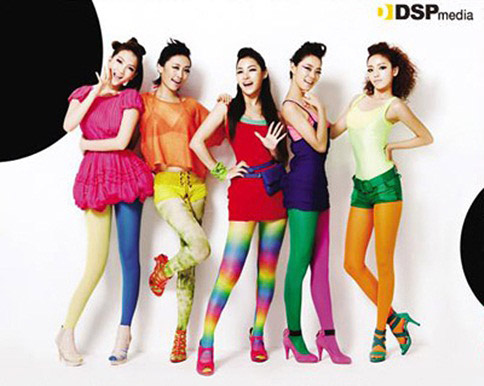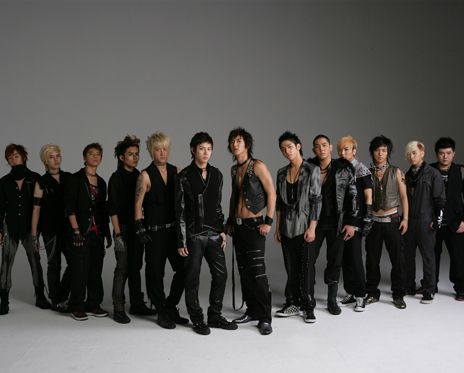Interesting to see so many K-pop bands turning on their management companies these days. Girl group Kara is the latest, with three members basically telling their management to get stuffed. Good for them, and for the member of Dong Bang Shin Gi and Super Junior who did the same thing. And anyone else. But I doubt their actions are going to change anything, not unless people start to address the underlying problems.

The problem, in my humble opinion, is the fundamental difference between the management companies and their talent, along with the huge gulf between the powerlessness of the star wannabes versus the complete power of the stars.
The K-pop business model is basically unchanged since SM Entertainment created HOT way back in the mid-1990s. The management companies find aspiring young people, train them relentlessly for years, then create a group for their top talent and try to make them stars, mostly through TV appearances. Yes, you have the Internet now, and all the changes it has brought. And cable TV and established interest in Korean acts overseas. But for the most part, the formula is the same.
A big company like SM Entertainment (or JYP or whoever) will likely have 50 or 70 kids in training at any one time. That’s a lot of ramyeon noodles and dance instructors and real estate to pay for. The big companies especially need a steady revenue stream to pay for all of that. So it is no surprise the kids are treated like commodities, like links in the supply chain. After all, the supply of young hopefuls is endless. The number of successes available is very small.

The stars and the fans, however, tend to see things very differently. The young stars and starlets are savvier than ever. They know what kind of money they are making for their bosses. They know they are the show. Japanese management might be able to change Morning Musume’s members almost every year, but Korean fans freak out when management tries to change their bands (ie, the 2pm and Super Junior fiascos).
Japan, though, is changing the situation in Korea a lot. Japan is now the biggest music market in the world (as they are just about the only ones still buying CDs). Ever since DBSG had a huge 2009 in Japan (earning around $100 million, for CDs, concerts, and ancillary rights), everyone has been excited about Korean pop there again… Kara and Girls Generation did great in Japan last year. From what I have heard, K-pop is the biggest it has been in Japan since the heydays of Boa and WINTER SONATA.
Korea has never been a big market for music. While the Korean movie market is much larger than you would expect for Korea’s economy, the music market is much, much smaller. So the labels and managers have always had exports on the brain. But I doubt they have ever had a year in Japan as good as 2010.
So you have three members of DBSG break off and form JYJ, trying to make it on their own. Two or three members of Super Junior leaving the group. And now three members of Kara leaving their agency. But will it really make a difference in the Korean music industry? I doubt it.
Maybe the band are getting paid better, maybe they have control over their own lives — great for them. The Korean courts have generally been supportive, but the management companies are not about to let go easily. But I do not see any fundamental shift in how talent is discovered or groomed. No change in how the music is produced. No change in how fans get to experience and consume that music.
Look at Rain, who left JYP Entertainment three years ago to forge his own career, only to go back to JYPE last month. The prodigal song.
Now you have a situation where the Korean management companies can find and develop the top talent, but they cannot hold on to them. And the aspiring wannabe stars cannot develop on their own, without the expertise and connections of the management companies. Clearly, the Genie (For Your Wish) is out of the bottle, and something has got to give.

I think the Korean music industry is basically the victim of its own success. Their business model has taken them about as far as it can go, but now something different is needed. Hip hop is good example, as groups and performers like Epik High, Tasha (Yoon Mi-rye), and Drunken Tiger have escaped the management system and had great success on their own while (most importantly) making better music. With iTunes, Soundcloud and other online music portals, no band needs to be controlled by managers/labels anymore, like they were in the age of terrestrial TV dominance and record stores.
Korean indie bands going to SXSW and other music festivals (as Galaxy Express, Vidulgi Ooyoo, Idiotape, and Apollo 18 are this year) is also a big step forward. The summer music festivals, like Jisan Valley and Pentaport, also help open the market and show people other ways of doing things.

This is not an argument against pop music–I like good pop, as much as any genre. But I am saying that the current way the Korean pop music industry is built is inherently broken, and until the management companies and the aspiring talent and the fans all recognize this and make changes, nothing is going to change.



This is a well thought-out and very well stated point of view. Many changes need to be made in the Kpop industry before the whole thing finally just topples over and lies there in a mess.